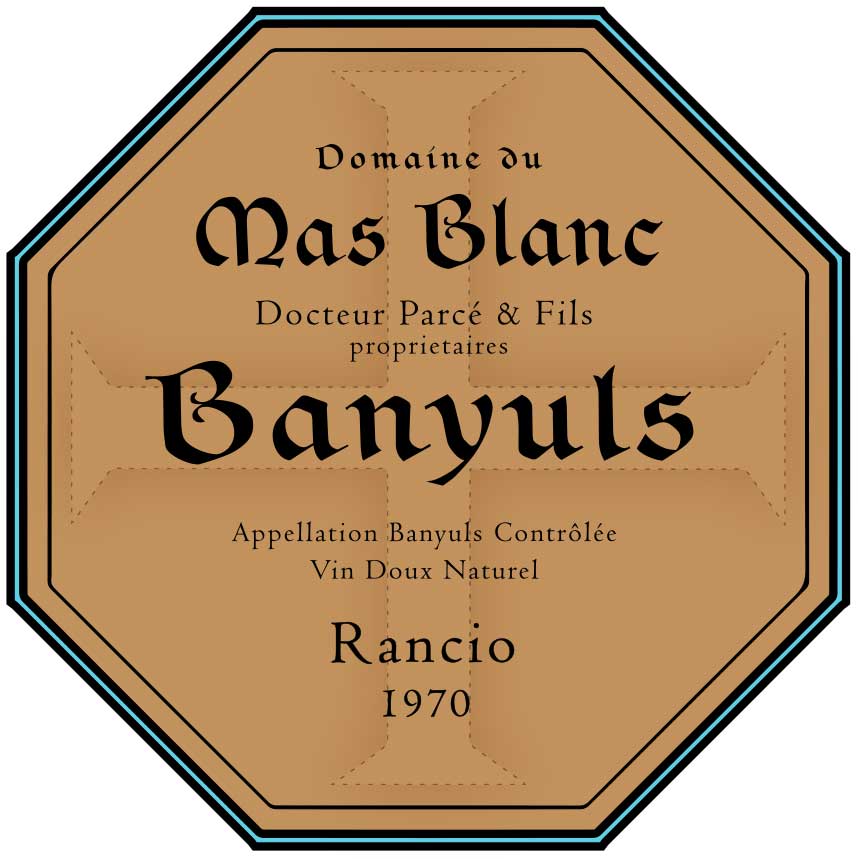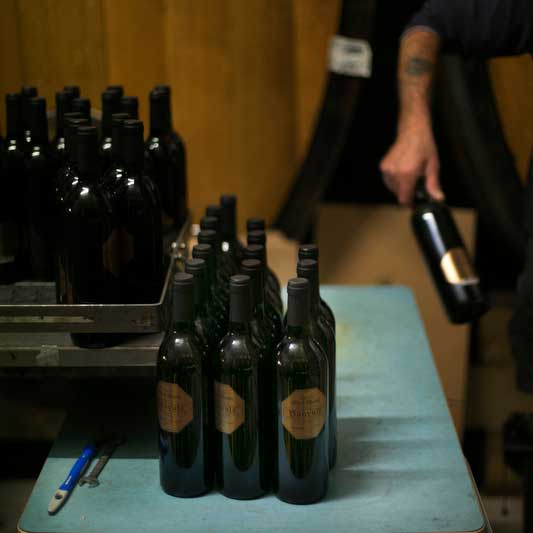Domaine du Mas Blanc Banyuls Rancio 1970

|

|
Only two vintages of Domaine du Mas Blanc Banyuls Rancio are known to have been previously released to the public—1970 and 1973—both in very limited quantities. The origins of its distinct “rancio” character—its umami, browned butter, hazelnut, and curry spice expression—can be traced to a particular demi-muid, thought to date to the late 19th century. Typically, its contents are blended into the Banyuls “Vieilles Vignes” and Mas Blanc sostrera (solera) for complexity, with a modest amount set aside for the enjoyment of the Parcé family on special occasions.
It was this wine—from winemaker Jean-Michel Parcé’s personal collection—that was presented to Sotolon Selections for its Domaine du Mas Blanc legacy project. Each bottle was opened and assessed, and the best were re-bottled in 375-ml format—assurance of the wine’s impeccable provenance and quality. Alas, quantities are extremely limited.
(50-59ºF)
(55-64ºF)
(59-64ºF)
About Domaine du Mas Blanc
 Base map data ©2017 Google, Inst. Geogr. Nacional
Base map data ©2017 Google, Inst. Geogr. NacionalDomaine du Mas Blanc and the family of “Docteur Parcé” have been the driving force behind the Banyuls and Collioure appellations for three generations. The domaine's roots can be traced to 1632, but its modern history dates to 1921, when Dr. Gaston Parcé began bottling his wine and became the leading proponent of the Banyuls appellation, established in 1936. He was succeeded by his son, Dr. André Parcé, who in turn was the visionary behind the Collioure appellation, established in 1971. André's friendships with the families of Beaucastel, Chave and Tempier led to cuttings from those estates finding home in Domaine du Mas Blanc's terraced vineyards overlooking the Mediterranean Sea. Since 1976, the domaine has been led by André's son, winemaker Jean-Michel Parcé, who continues to further his family’s commitment to tradition and reputation for leadership in the appellations. Full details
About Banyuls AOP
Banyuls is the finest and most complex of France’s fortified Vin Doux Naturels, a dark wine borne of sea, sun and stone. It emerges from one of the most spectacular terroirs in all of France: a terraced patchwork of steep, windswept vineyards set hard by the Spanish border, where the Pyrénées tumble into the Mediterranean Sea. This is Catalan country, stubborn and fierce, where man and mule have tended ancient vineyards for centuries.
With Maury and Rivesaltes, Banyuls was one of the first appellations recognized under the French AOC system in 1936. Co-extensive with Collioure, its schist-dominated vineyards rise to altitudes of 750 meters and retain the distinctive “feixas” terraces and stone-lined canals known locally as “les agulles” (“the needles”), constructed centuries ago to prevent erosion and manage the region’s infrequent but often torrential downpours.
There are four Banyuls communes that dot the coastline of the Côte Vermeille before the Spanish border: Collioure, Port-Vendres, Banyuls-sur-Mer and Cerbère. With old vines and exceedingly low yields, production is necessarily tiny. Banyuls can be made white, rosé or red, but the large majority of wine produced is red, and Grenache noir, gris and blanc form the backbone of any blend. It can be made in two basic styles, depending upon its elevage: Banyuls Rimage is bottled young, its evolution (like that of vintage Port) necessarily in the bottle. Banyuls traditonnel is aged oxidatively for a minimum of five years before bottling; with or without temperature control (and occasionally out-of-doors); and in a variety of containers ranging from old barrique, demi-muids and foudres, as well as glass demijohns. Classic Banyuls is defined by its grace and nuance, its proximity to the sea serving to temper its native power, lending a savory, smoky maritime character to its wines.
| SKU | Vintage | Region | Origin | Desc | Cepage | % Alc | Size/Pack | Finish | BTL Barcode | Cs Barcode | Cs Wgt |
|---|---|---|---|---|---|---|---|---|---|---|---|
| HZ 6968-1970 | 1970 | Roussillon | FR | Oxidative/Oxidized Wine; Fortified | Grenache noir | 17.5% | 375/6 | cork | 3760041044001 | 23760041044005 | 5.90 kg |



